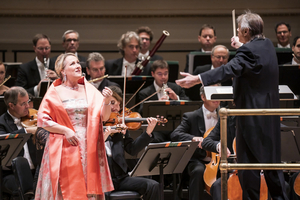Review: Bavarians under Jansons with Damrau as Soloist Turn Back the Clock at Carnegie Hall

Photo: Chris Lee, 2019
Shortly after this review was written, conductor Mariss Jansons died at age 76, after a longstanding battle with heart disease.
According to the Carnegie Hall program, the Bavarian Radio Symphony Orchestra--known in its home territory, Munich, as the Symphonieorchester des Bayerischen Rundfunks--was founded just a year after the most modern pieces on last Friday's program were written.
Those were Richard Strauss's "Four Last Songs (Vier letzte Lieder)," composed in 1948, some of the most gorgeous music he wrote. They're enough to get me to any concert on their own, particularly when the soprano on the program is someone like Diana Damrau, as it was Friday night, or Jessye Norman, who made a wonderful recording of them. (It was noted in the program that the songs were written for Kirsten Flagstad, the noted Wagnerian, so maybe Norman's larger-than-life approach was what Strauss really had in mind.)
Damrau was announced as suffering from a head-cold, but I thought she sounded pretty fine and creamy (and very involved) for someone out of sorts, and looked glamorous though perhaps a little more subdued than usual, at least until the curtain calls. The orchestra and Jansons were disappointing to me, not helping Damrau out with an approach that sounded too bombastic, which seemed their tone for the evening. (Did they need more time to get used to the hall's acoustics?)
I had a similar complaint about their approach to the "Four Symphonic Interludes" from Strauss's opera INTERMEZZO, which started the concert. INTERMEZZO was written as a series of brief scenes connected by the interludes, dating to 1924 but not getting to the US until Santa Fe took the leap in 1985, with the marvelous Elisabeth Soderstrom as the jealous wife. While the reception to the US premiere was good--Bernard Holland in the New York Times called it "both a surprise and a delight," with the orchestral interludes "Strauss at his most attractive and ingratiating"--the opera never really caught on here.
Maybe it works better as a whole (and in English, as it was in Santa Fe), with one of those 'based on a true story' libretti that was written by the composer himself, after everyone but his mother turned down the assignment. In brief, it sounds like an episode of "I Love Lucy": A love letter meant for another musician ended up in Strauss's mailbox and his wife nearly divorced him because of it.
Never having seen a staged production of the work, which are few and far between--was Lauren Flanigan's at the old City Opera the last in NY?--frankly, I can't say this performance made me want to hear more of it, though this may be a matter of the Bavarians' approach as much as my own taste. (My Strauss tends toward SALOME, ELEKTRA and DIE FRAU OHNE SCHATTEN.)
Yes, I found the orchestral excerpts somewhat charming--though the waltzes were not-quite ROSENKAVALIER quality--but in the "Card Table" scene and elsewhere, the music came across as a bit too cacophonous rather than lively, at least in the hands of Jansons and company.
Though I really came for the songs and excerpts from INTERMEZZO, as it turned out, the symphony, Brahms's Fourth, was what made the evening for me. The orchestra sounded totally in its element with the Brahms, with particularly wonderful solo work from the winds (oboe Stephan Schilli and flute Philippe Boucly) and the concertmaster Radoslaw Szulc.
Jansons brought out the Romanticism, the driving tempi and dynamics from his musicians, in a whirlwind of sound. The beauty and majesty of the writing--and the orchestra's playing--made the 40 minutes or so fly by, with the feeling of the music engulfing auditorium. As if to confirm the orchestra's love for Brahms, there was an encore: his Hungarian Dance No. 5 in a sprightly performance that left the audience smiling.
Nonetheless, the program as a whole could have been at home on the orchestra's opening concert 70 years ago. The program notes claim that the orchestra has a tradition of championing new works, though the Hungarian Peter Eotvos (composer of the ANGELS IN AMERICA opera), at 75, is the only one still alive among those mentioned. Too bad the Bavarians didn't take the opportunity to introduce an interesting, contemporary German composer to New Yorkers.
Add Your Comment
Play Broadway Games
Videos





%20(1024%20×%20512%20px).png)
